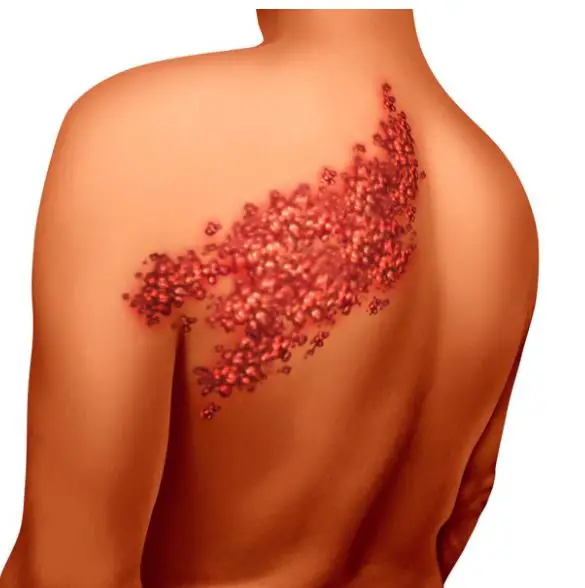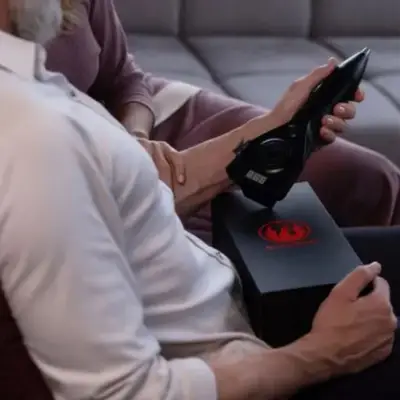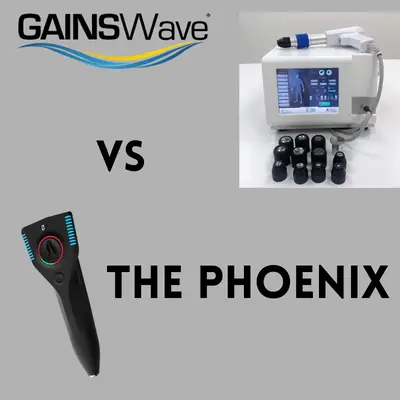A TENS unit helps with all kinds of pain, using electrical pulses to promote the production of pain-killing hormones in the body. But can it help with pain caused by shingles?
If patients that are suffering from shingles pain may want to try an alternative to medical painkillers, they can diminish the chronic pain significantly by using a TENS unit. TENS Therapy is safe and a drug free form for getting quick pain relief.
Shingles aren’t a life-threatening disease, but they are quite painful to live with. Even though vaccines can help reduce the risk of shingles, and early treatment can help shorten a shingles infection, there is still a risk of complication. The most common such complication is postherpetic neuralgia, which causes shingles pain for a long time, even after your blisters have cleared.
What causes shingle nerve pain?
Shingles are a viral infection of the nerve root, and it affects 1 million people in the US a year. In most cases, people recover from it, but for up to 50% of people over the age of 60 who have not been treated, the pain doesn’t go away. The pain can last for weeks, months, years, or even for the rest of their lives.
These people have postherpetic neuralgia (PHN), which is the result of the shingles virus damaging the nerves of the skin. For some people, the pain is mild, while for others, even the slightest touch, or even a breeze, can be excruciating. It causes a large deal of suffering, and it can seriously disrupt people’s lives.
Shingles are caused by the varicella-zoster virus, the same virus that causes chickenpox. If a person has been exposed to chickenpox, the virus in that person’s body will never go away, as it can lie dormant in the body’s nerves.
If you have shingles, the most important thing to do is talk to your doctor about the risk of developing PHN. Immediate treatment can dramatically reduce the likelihood of developing long-term pain.
Since psychological distress is a risk factor for PHN, it is believed that people who
have shingles could benefit from getting out and not being isolated and homebound.
Source: https://www.medicalnewstoday.com/articles/160253#prevention
What is a TENS unit?
Transcutaneous electrical nerve stimulation, or TENS, is a method of pain relief that involves the use of a moderate electrical current. It is a small machine, and it is battery-operated. It has leads that are connected to sticky pads called electrodes.
A TENS unit is a non-invasive method used for relieving pain. Some people are able to reduce the intake of pain medications thanks to the TENS unit.
The unit is also very convenient because it is quite small, portable, and discrete. You can carry it in your pocket, or clip it onto a belt to ensure that you have instant access to pain relief throughout the day.
It has controls that allow people to apply an appropriate level of pain relief. This can be achieved by altering some aspects of the electrical current, such as intensity, frequency, and duration.
The frequency refers to the number of electrical impulses per second. High-frequency pulses range from 80 to 120 cycles per second, and they are believed to help acute pain.
Low-frequency pulses range from 1 to 20 cycles per second and are more suitable for the treatment of chronic pain.
Need to know how to use the settings on your TENS unit? Click here
What does a TENS unit do?
To use the TENS unit, attach the sticky pads directly to your skin. Once the machine is switched on, small electrical impulses are delivered to the affected area of your body, which is often described as a tingling sensation.
These electrical impulses reduce the pain signals going to the spinal cord and brain, which can help relieve pain and relax muscles. They can also be used to stimulate the production of endorphins, which are known to be the body’s natural painkillers.
The TENS unit helps with period and labor pain, postoperative pain, joint pain, neck, and back pain.
It is also believed to alleviate the pain that comes from endometriosis, arthritis, sports injuries, multiple sclerosis, fibromyalgia, diabetic neuropathy, and spinal cord injury.
Source: https://tensunits.com/pages/how-does-a-tens-unit-work#
Can a TENS unit help with shingles pain?
After someone had chickenpox, the virus stays dormant in most cases, but in other cases, like people with immune systems that have been weakened by disease or treatment, it can reappear. This usually happens years or decades after they had chickenpox.
Once it comes back, the virus causes shingles, which is a rash. It often appears as a band on one side of the body. The early shingles symptoms are headache, light-sensitivity, and flu-like symptoms. Next, itching, tingling, or extreme pain can develop where the rash is, and the pain can be moderate to severe.
Even though people who haven’t had chickenpox can catch it from you, the shingles themselves aren’t contagious.
Physical stress can be a potent factor for developing PHN. A study conducted in 2005, showed that people with shingles who went on to develop PHN were more likely to have had symptoms of personality disorders, hypochondria, intense worry about their disease, and other bodily complaints.
One study even found that people who were living alone had a greater chance of developing PHN than people living with others.
Researchers have known for a long time that older people are more likely to get PHN, the nerve pain after shingles, but recently, some other factors that increase risks have been found.
The five risk factors for developing PHN in someone who had been recently diagnosed with shingles are: being older, and a female, presence of symptoms before the rash appeared, such as numbness, tingling, itching, or pain; severe pain during the illness’s first stages, and severe rash.
Depending on how long the PHN lasts and how painful it is, people with the condition can develop some symptoms that are common with chronic pain, such as depression, fatigue, having a hard time sleeping, lack of appetite, and difficulty concentrating.
Chronic pain can be controlled by pain killers, which can be highly addictive. For people that have become immune to the pain killers, or prefer to take a more natural approach to pain relief, a TENS unit can do wonders.
TENS, Transcutaneous Electrical Nerve Stimulation, provides a non-invasive drug-free method of pain relief for shingles. Electrodes, which come in the shape of sticky pads, are placed near the area of pain. Soothing pulses are sent via these pads through the skin and along the nerve fibers. They suppress pain signals that are sent to the brain and instead encourage the body to produce higher levels of its own natural pain-killing chemicals, which are endorphins and encephalins.
There are two electrodes per channel, two channels per unit in every TENS unit.
Each channel has one electrode that transmits electricity and the other electrode is the ground or where the electricity from the first electrode travels to in order to be absorbed. One electrode sends electricity and the other removes the electricity from the body. This is done to allow the targeting of the electrical stimulus to a specific area.
One electrode, coming from channel 1, is set directly beside the starting point where the dermatome exits the spinal cord. The other electrode for channel 1 is placed about 2/3rds of the way down the dermatome.
On channel 2 one electrode is installed between the two electrodes about 1/3rd down, and the other electrode from channel 2 is set at the distal end of the dermatome, or the end of the area where the patient is experiencing pain. This electrode arrangement now covers the entire dermatome from point of insertion to the farthest point on innervation with an electrical chemical stimulus and also influences the sensory nerve endings to stop or severely reduce the severity of the pain.
With interferential therapy, the patient should feel instant pain relief, which prolongs from hours to days, and possibly even weeks. Once the patient reaches the point where pain relief is reaching a week, the probability of continued pain should be diminishing completely.
Some reports say that a TENS unit can even help with the shingles outbreak itself.
Sources:





4 responses to “Can a TENS Unit help with Shingles Pain?”
[…] units are sometimes used to provide pain relief during the early stages of labor, but keep in mind that it’s not recommended that pregnant […]
[…] you know……In addition to alleviating knee pain a TENS unit can also be used to help:• Knee arthritis• Knee tendinitis• Knee replacement […]
[…] is no single consensus for how a TENS unit is able to quell sensations of pain, and trials and tests are still ongoing. Yet, based on the amount of current evidence and consumer […]
[…] Finally, using a Tens unit can help reduce the risk of developing chronic phantom limb pain […]